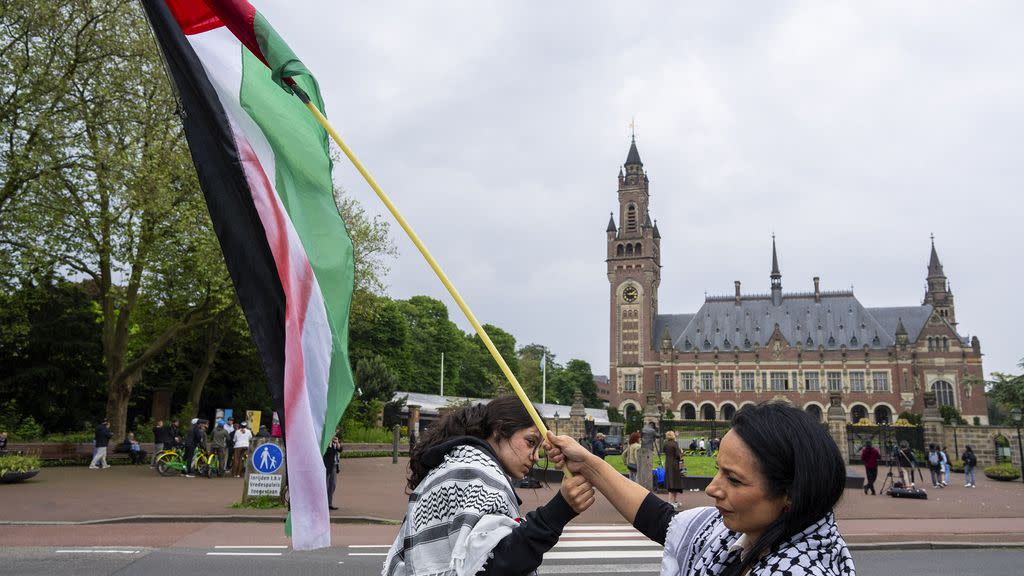International Court of Justice rules Israel should cease Rafah offensive

Judges at the top United Nations court have called on Israel to halt its intended military offensive in the city of Rafah in a session in the Hague on Friday.
The International Court of Justice President Nawaf Salam, who led the court's hearing, quoted UN officials who repeatedly underscored the humanitarian risks of the military offensive in Rafah, where some 800,000 Palestinians are displaced.
He called on Israel to "halt its military offensive in Rafah", citing that the Palestinian people were at an "immediate risk".
Salam said that provisional measures that had previously been ordered by the court in March did not fully address the situation in Gaza now. He maintained that this emergency order was necessary due to the "disastrous" humanitarian situation in Gaza.
It is the first time the court has told Israel to halt its military operations, as it previously ordered Israel to prevent acts of genocide and allow aid to enter Gaza.
Netanyahu says his country will 'fight with fingernails' if US curbs weapons
ICJ throws out Nicaragua's case asking Germany to halt aid to Israel
The case was brought to the ICJ by South Africa via an emergency measure as part of a larger case South Africa has taken to the court about Israel's actions in Gaza. The wider case brought by South Africa accuses Israel of orchestrating genocide against the Palestinian people.
In the same hearing, the ICJ ordered Israel to open the Rafah border crossing in order for humanitarian aid to enter Gaza and submit a report on its progress within a month.
Reactions a mix of praise and derision
The immediate reactions to the ruling have been mixed.
"The order of the antisemitic court in The Hague should have only one answer – the occupation of Rafah, the increase of military pressure and the crushing of Hamas, until the complete victory in the war is achieved," Israel's National Security Minister Itamar Ben-Gvir said in a post on X (formerly Twitter) on Friday.
The leader of the Israeli opposition, Yair Lapid, also derided the decision, saying, "The fact that the ICJ did not even directly connect the end of the military operation in Rafah to the release of the hostages and to Israel’s right to defend itself against terror is an abject moral failure.”
Within the court, Israel has argued that their military operations are targeting Hamas and not civilians. Israeli Prime Minister Benjamin Netanyahu said he would convene a special ministerial meeting immediately after the ruling to decide how to respond.
Elsewhere, the ruling was met with praise. South Africa's foreign ministry chief Zane Dangor said that the decision was "ground-breaking" and noted it was the first time the ICJ made an explicit order to halt operations in Gaza.
Humanitarian aid groups have long been warning against the Israeli army's decision to invade Rafah, saying that an invasion into the southern Gazan city would constitute a humanitarian tragedy.
Israel started issuing evacuation orders about two weeks ago into the heavily populated city of Rafah. Several of Israel's allies, including the US, have warned against the invasion, which Israel insists is necessary to defeat Hamas.
What can the ICJ actually do?
The ICJ, also known as the World's Court, is one of the six principal organs of the United Nations and the only international court adjudicating general disputes between nations.
Its rulings are officially binding but have been previously ignored as the court lacks any enforcement powers. Russia, which was ordered in 2022 to halt its full-scale invasion of Ukraine, has yet to respond to its ruling.
The ruling's immediate impact might lie in its ability to apply pressure on Israel and its international allies.
"International courts - the ICC Monday and the ICJ today - have lived up to expectations this week. It is now the States' responsibility to force the parties to this conflict to respect this decision" lawyer Johann Soufi, former Head of UNRWA Legal Office in Gaza told Euronews.
"The ICJ’s decision opens up the possibility for relief, but only if governments use their leverage, including through arms embargoes and targeted sanctions, to press Israel to urgently enforce the court’s measures,” associate international justice director at Human Rights Watch Balkees Jarrah said.
Another international court, the International Criminal Court (ICC), files charges against individuals it considers responsible for genocide and war crimes. On Monday, its chief prosecutor Karim Khan asked ICC judges to approve arrest warrants for Netanyahu, Israeli Defence Minister Yoav Gallant, alongside three top Hamas leaders — Yahya Sinwar, Mohammed Deif and Ismail Haniyeh.
Although Israel is not a member of the ICC, both Netanyahu and Gallant would face travel restrictions if the arrest warrants were issued.


